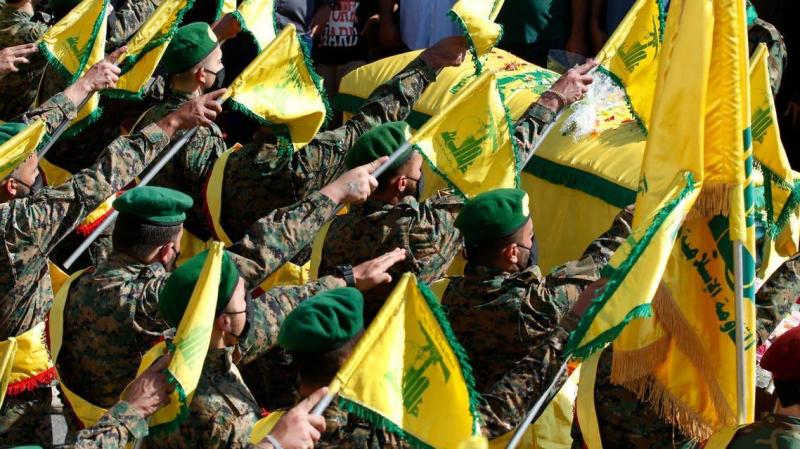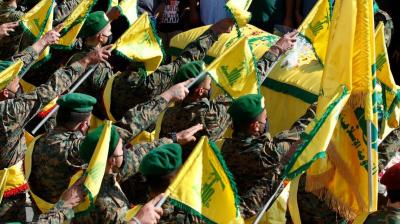Under the title "The Kuwait Cell and European Reinforcements: The World Responds to Hezbollah Terrorism," Sky News reported that following the announcement of the arrest of a terrorist cell linked to Lebanese Hezbollah in Kuwait—according to the newspapers Al-Qabas and Al-Rai—several European countries warned about the threat posed by the organization after detecting potential terrorist activities. This prompted them to renew demands for Hezbollah to be classified as a terrorist organization in both its political and military wings by the European Union.
On Thursday, the Kuwaiti Public Prosecution ordered the detention of 18 individuals in a case involving financing for Lebanese Hezbollah, stating in a statement that they are accused of "three state security charges: joining a banned party, money laundering, and espionage."
In this context, a recent study issued by European centers for counter-terrorism and intelligence studies highlighted increasing fears among European countries regarding internal threats from Hezbollah, particularly following its involvement in illicit activities and money laundering related to Europe.
### Potential Terrorism in Europe
According to estimates, Hezbollah poses a serious threat to Europe amid increasing demands from some European nations and the United States to ban the organization entirely, including both its political and military wings. Countries such as Austria and the Netherlands view the distinction between the political and military wings as a mistaken policy.
Jasem Mohammed, president of the European Center for Counter-Terrorism and Intelligence Studies, stated that condemnations in multiple European countries indicate Hezbollah's involvement in using European territories to store some of its suspicious or illegal supplies, such as the unlawful storage of tons of ammonium nitrate. He explained in a statement to "Sky News Arabia" that Hezbollah exploits the European continent as a base for operations and recruitment, with its bases in Europe also being a central part of a global illicit financing network. This includes the trafficking and distribution of illegal drugs, arms trade, and organized money laundering involving various organizations.
Mohammed noted that the European Union already classifies the military wing of Hezbollah as a terrorist entity, but there are currently concerted efforts to list both its military and political wings as terrorist organizations. According to Mohammed, France is the most significant opponent of the recommendation to list the party in its entirety, pointing out that the EU currently categorizes Hezbollah's "military wing" as a terrorist group, but not the political wing. He stated, "It is true that Hezbollah is also one of the largest parties in the Lebanese parliament, but separating the party's political and military wings is a difficult and perhaps incorrect task, and the EU must prioritize the interests of the Lebanese people."
### Why the Delay in the European Decision?
Regarding the reasons for what observers describe as "delayed" actions, the study notes that EU member states have been divided for a long time and were concerned that a clear and explicit designation of "Hezbollah" as a terrorist organization could provoke attacks on European interests or target United Nations peacekeeping forces in Lebanon.
In July, American lawmakers from both the Democratic and Republican parties in the House of Representatives and the Senate called on the EU to take action to issue a resolution designating Hezbollah as a fully terrorist organization, which served to stir up stagnant waters.
Meanwhile, a report by South Front titled “What Are Hezbollah’s Military Capabilities?” stated that the number of Hezbollah fighters is approximately 65,000, including reservists, with 21,000 professional fighters undergoing permanent training, 8,000 of whom are currently fighting in Syria.
According to the report, Hezbollah possesses a massive arsenal of rockets, estimated to number between 50,000 and 120,000 pieces. In mid-May, Austria banned the activities of Lebanese Hezbollah and categorized it as a terrorist organization, including both its political and military wings, thus exceeding the EU's policy of restricting itself to banning only the military arm.
In January 2020, the British Treasury classified Hezbollah across all its wings as a terrorist group and decided to freeze its assets. The UK was not alone in its efforts against Hezbollah networks in Europe, as the German Interior Ministry decided in April to ban the party in both its military and political facets. However, the Netherlands was the first European country to ban Hezbollah, as in 2004, Amsterdam announced a complete ban on Hezbollah activities within its territory, making it the first European nation to take such action.




